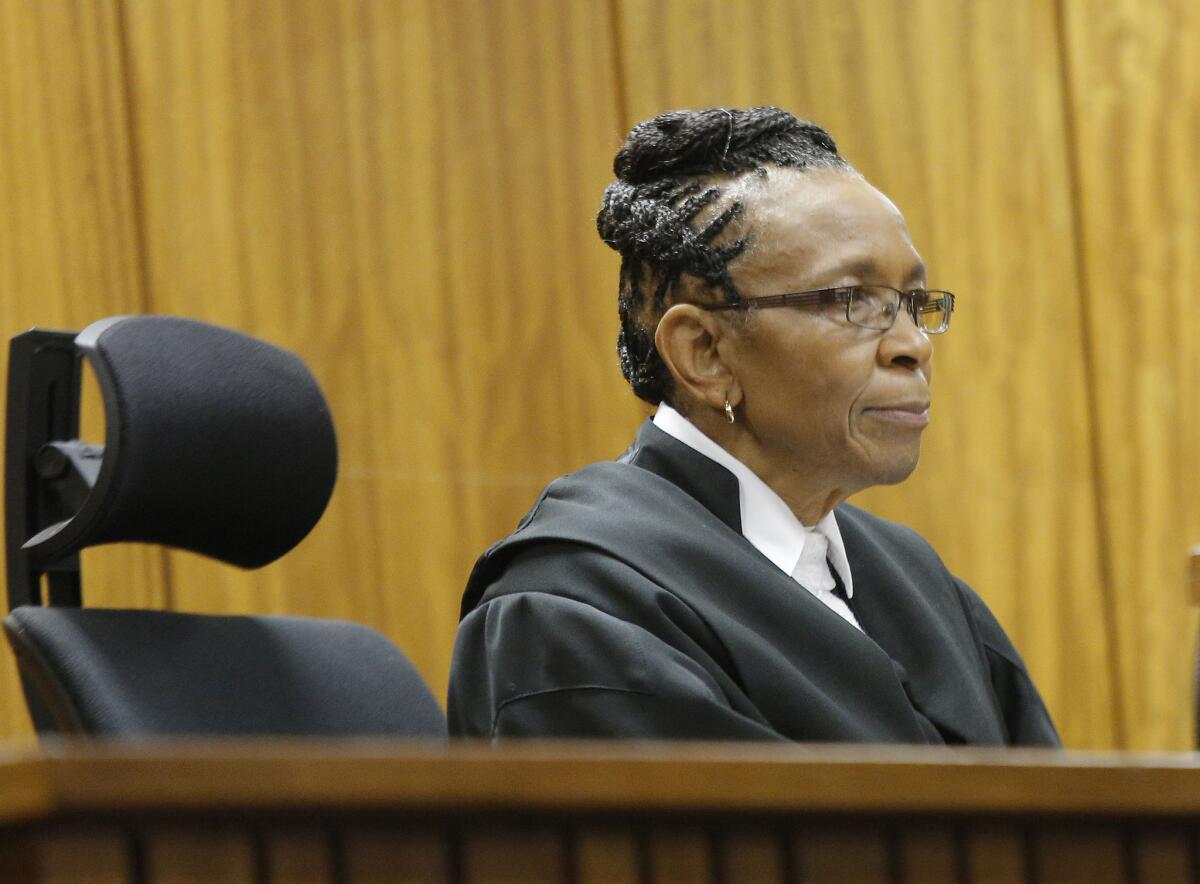South African judge OKs appeal of Oscar Pistorius’ murder acquittal

- Share via
Reporting from Nairobi, Kenya — Oscar Pistorius may yet face a murder conviction after South African prosecutors Wednesday were given permission by the trial judge to appeal her acquittal of the Olympic athlete on the charge.
Pistorius would face a mandatory 15-year prison sentence if the acquittal is reversed by the Supreme Court of Appeal instead of the five-year term he was given after Judge Thokozile Masipa found him guilty in September of culpable homicide.
Masipa said Wednesday that there was more than a remote chance the prosecution would succeed in its appeal before the Supreme Court of Appeal.
Prosecutor Gerrie Nel failed, however, in his bid to convince Masipa that her October sentence of the double amputee athlete was “shockingly inappropriate” and was refused permission to appeal for a stiffer sentence. Under South Africa’s legal system, Pistorius is eligible for release from prison after serving 10 months.
Prosecutors still have the option of petitioning the Supreme Court to enable an appeal against the original sentence.
The Pistorius trial enthralled global audiences as a man seen as a global icon for advancing the cause of disabled people had to answer for killing his girlfriend, Reeva Steenkamp. Pistorius had been the first double amputee to compete in the Olympic Games.
He shot and killed Steenkamp, firing four shots into an enclosed toilet off his bathroom in the early hours of Valentine’s Day last year, claiming he believed she was a burglar.
The prosecution argued it was murder, since he was a trained gun enthusiast who fired repeatedly into the cubicle knowing there was a person inside and knowing his actions would likely kill that person.
The prosecution can only appeal on the basis that the judge in the case made a legal error.
Pistorius’ advocate, Barrie Roux, argued there was no error in law. He said that Nel didn’t like losing the case and was appealing for that reason.
The prosecution had to overcome a significant legal hurdle to win the right to appeal: a decades-old legal decision that prevented appeals on acquittal for a serious offense if an accused person was convicted on a lesser offense. Nel argued against this restriction, and Masipa’s decision to grant leave to appeal may have the long-term legal impact of broadening the rights of South African prosecutors to appeal in future.
Professor James Grant, a legal expert who advised the prosecutor on its appeal, said on Twitter that Masipa’s decision could deal a fatal blow to the restriction and make legal history.
The prosecution will press for the appeal to be heard as early as possible next year, although appeals normally take many months to come to court.
A spokesman for the National Prosecution Authority, Nathi Mncube, welcomed the decision, saying there were many questions in Masipa’s judgment that needed to be clarified.
Mncube said the authority would consider whether to petition to the Supreme Court for the right to appeal the sentence.
“It’s not about winning,” he said. “It’s always about justice, and justice has been served.”
Follow @robyndixon_LAT on Twitter for news out of Africa
More to Read
Sign up for Essential California
The most important California stories and recommendations in your inbox every morning.
You may occasionally receive promotional content from the Los Angeles Times.










